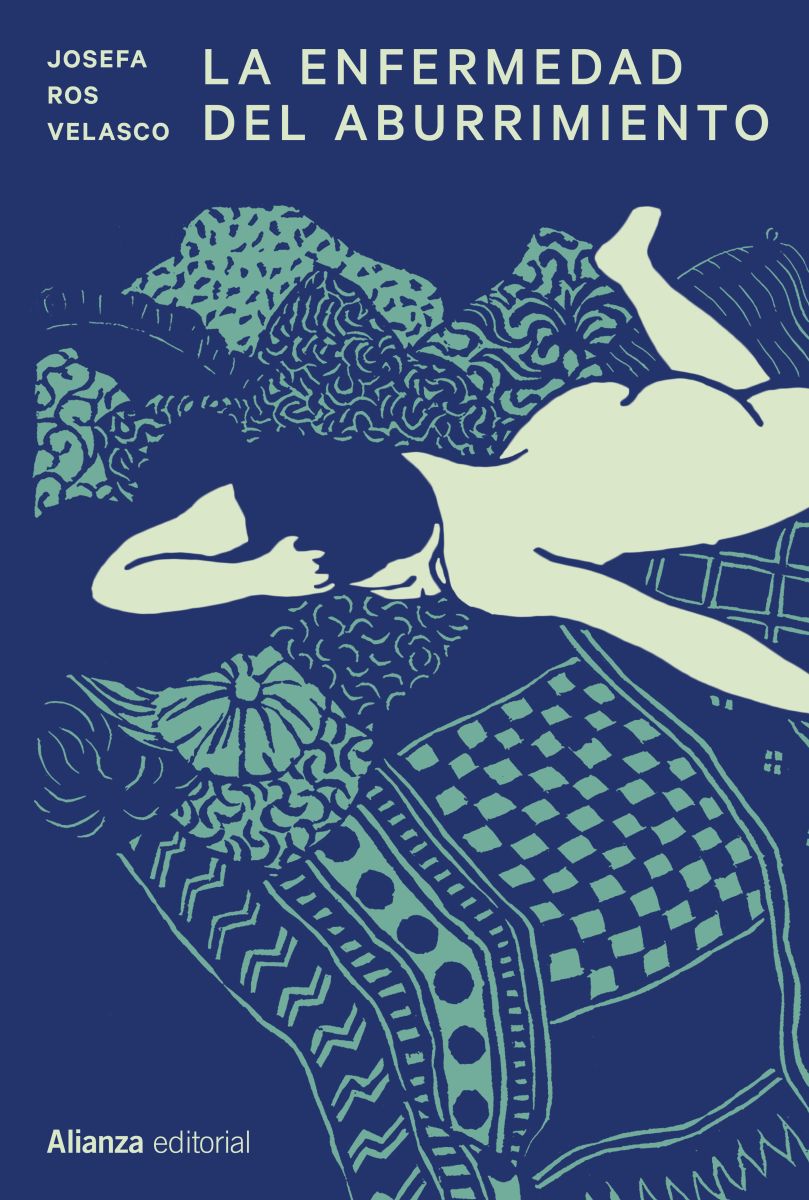
My dear readers, it has been a long time since I last shared with you my reflections on the experience of boredom in older people. I have not forgotten who you are, nor the affection you have shown me since I started writing in the blog Aging in Society, just two years ago. I couldn't, even if I wanted to; the sincere support you give me, with your attentive reading of my articles, the comments of thanks you write to me by email and the diffusion you give to my work in networks, encourages me to fight tirelessly to ensure that we can all live an old age free of tedium. If I have not been as constant as I used to be during these months, it is because I have been busy with the task of bringing my first book, La enfermedad del aburrimiento, published by Alianza Editorial on 28 April, into the world.

I have been working on this essay for the last decade of my life; I can hardly remember doing anything else. In its pages I have compiled all my knowledge of this elusive everyday phenomenon that torments us when reality does not meet our expectations; that visits us all at some time, in its simplest and most passing form or in its deepest and most lasting expression; that we even come to feel in groups; that causes us pain to the point of being willing to do anything to put an end to it. That boredom from which emanates human creativity and also destruction, the experience of which is pathological to the point of being attributed to illness. That which, however, is nothing more than a symptom that alerts us that the relationship with the environment is damaged; that which, at the end of the day, urges us to delve into the root of the problem and repair it.
I have always wanted to teach others to listen to the voice of boredom, to explore its reasons and to direct their actions, with the resources at their disposal, to return to an optimal state of contentment by promoting adaptive responses. I set out to write The Disease of Boredom to fulfil this dream, showing, on the one hand, the multifaceted nature of its experience, in a journey through the different spaces in which it has historically played a leading role, and, on the other, delving into its nature, highlighting its functionality and sharing the keys to making the most of it. My intention, ultimately, is none other than to ensure that those who now embark on reading it embark on a journey towards a radical change in the way of perceiving and dealing with boredom.
So far, the reception of my creature has been positive. In the last week, important national media such as El Mundo or RNE are echoing the launch of La enfermedad del aburrimiento, and I am even going to appear on La aventura del saber! The opportunity to give visibility to the issue of boredom on a media scale excites me, because I know that it will mean that, as a society, we will be more aware of the problems caused by being bored on a continuous basis and we will look for ways to prevent it in those contexts in which it is most pressing, such as in old people's homes.
In the middle of the cascade of interviews, which already exceed twenty, CENIE, which has given me so much, could not be without its own. It is coming up next! In the meantime, I announce that I will be signing copies at the Madrid Book Fair on 29 May, at the Alianza Editorial stand (with a presentation in the European Union Pavilion, together with my friend and prologue writer Carlos Javier González Serrano), and on 4 June, at the Dykinson Bookshop. I hope to be able to meet many of you! I am at your disposal at my email, website and Twitter account to provide you with more information, answer your queries or simply say hello.
Interview
Q. Boredom, as you say in your book, is an extremely annoying feeling that human beings try to run away from at all costs, so why did you decide to embark on an investigation into boredom? What led you to become interested in this subject?
A. The experience of boredom is annoying, even painful, but studying boredom is just the opposite of experiencing it! I avoid boredom by devoting part of my time to investigating the mysteries of this phenomenon that is so commonplace and yet so unknown. In the decade that I have been researching boredom, I have not been bored for a single moment. Nor does it seem that this field of study will bore me in the short or medium term. Every day I discover new niches from which to approach the casuistry of boredom. In this sense, I can only say that it was a wise decision to dedicate my life to boredom, precisely in order not to be bored. It is logical that humans - and some animals - try to avoid boredom at all costs. Few creatures like to feel displeasure. This is partly what led me to become interested in boredom. At some point I became aware that sometimes boredom cannot be easily escaped. Then it becomes something like a disease for which we desperately seek a cure.
Q. Boredom is a common experience, and there is no one who can say that they have not experienced or suffered boredom at some point in their lives. But why can't we escape boredom, why do we get bored?
A. There are more than a few who deny this initial assertion. There are those who think that boredom belongs to a specific historical context and to a specific social class. There are also those who attribute it to a certain stage of life. Almost everyone I talk to claims not to have time to be bored, as if boredom can't also - and very often - appear when we are busy: at work, listening to a lecture, visiting an exhibition, watching a film, reading this interview... Those who claim not to know boredom confuse this state with doing nothing, a condition that is not always identified with tedium. Be that as it may, boredom is the result of an imbalance between our need for cognitive stimulation and the perceived degree of stimulation of a situation or activity. We become bored when we are immersed in an experience that does not motivate us properly, that fails to hold our attention, or that has a negative cost-benefit ratio. We all find ourselves at this crossroads at times, but we usually get around boredom without a problem by changing our reality. We spend our lives searching for the new to escape boredom. It is from this virtuous circle that there is no escape.
Q. So is boredom good or bad, and can we even think of boredom in these terms?
A. We are hamsters on the wheel of boredom. We want something, we get it, and then we get bored, which leads us to yearn for the new, which we strive to achieve, and, surprise surprise, boredom again. Boredom is a necessary element to give continuity to the process of life. It prevents us from becoming trapped in the comfort of wish fulfilment and prevents over-adaptation. I prefer to speak of boredom in terms of functionality, rather than appealing to moral concepts of goodness and badness. Many say that boredom is good because it awakens creativity, even if what is created in response to boredom ends up being a monster. Others say it is bad because it triggers mood or behavioural disorders. Some fear it simply because it hurts. Yet pain is precisely the key to its functionality. Boredom forces us to explore possible ways to restore lost well-being, but it is we who choose the path of vice or virtue to banish it. However, I emphasise that there are also cases of dysfunctional boredom, when there is no way to avoid it expeditiously, when it becomes a disease.
Q. We are increasingly aware that emotions are historical, that is to say, that they have a specific origin and development. Is this also the case with boredom? Can we say that boredom is born at a specific moment? Have we always been bored?
A. The capacity to be bored is prehistoric in our species. Anyone can imagine a Homo antecessor getting bored while performing the mechanical work of repeatedly hitting a stone to transform it into a tool. In periods of overadaptation, when the urgency to ensure survival disappears, many basic situations or activities may cease to be cognitively stimulating and the search for novelty becomes an imperative necessity. It is impossible to pinpoint the moment when our ancestors first became bored, but we can, however, construct a probable history of boredom on the basis of the written - and even pictorial - testimonies that have been handed down to us since antiquity about the particularities of their experience in different contexts. In The Disease of Boredom I have dared to share a tentative reading of the paths boredom has taken throughout the history of the West.
Q. Maybe we haven't always been bored, or maybe we have, but have we always been bored in the same way? Regardless of how boredom has been perceived, and the cultural and moral meaning given to it in each period, was it always the same experience?
A. We have to be very cautious when it comes to researching boredom. The first obstacle we are going to come up against is that the word boredom is applied equally to very diverse - though related - experiences that take on different prominence in each historical period. So far, I have spoken of boredom in terms of our possibilities of reacting to it. Most of the time we reverse it by changing reality, but boredom can become entrenched in certain instances. When this happens, the experience is much more intense and painful. It is prolonged over time and can permeate all dimensions of existence. These entities of boredom have existed throughout the centuries, but they have not always cohabited. This persistent boredom is typical of contexts that generate states of tedium that are sustained by apparently immovable structures. Anything that entails difficulty is particularly interesting to us. The commonplaces from which this easily surmountable boredom emanates - tedious discourse, repetitive tasks, insubstantial conversations, etc. - have received anecdotal attention in the artistic and specialised literature. However, reflection on the spaces that cause chronic boredom has filled hundreds of pages throughout history. Delving into this kind of boredom has undoubtedly been one of our most successful strategies for alleviating it.
Q. Do you think that if, as you said before, it has had a birth, it could also have an end, a death? Does it make sense to think about the end of boredom?
It doesn't make any sense at all. Thinking about the end of boredom is similar to imagining that we can go on living without an acquired capacity for survival that we enjoy on a daily basis and that puts us in a privileged position with respect to other species in the evolutionary race. We are what we are because we have become bored, we will continue to be because we will become bored, and we will cease to be if we do not become bored. The death of boredom would be our own, unless another known or yet-to-be-known state were to take over its function. To eradicate boredom once and for all is not only not possible, it is also undesirable. The price we would pay for a life without boredom could be very high and lead to extinction.
Q. What can we do, as individuals and as a society, to learn to live with boredom?
A. Talk about your experience. We have always tried to hide boredom. The Greeks hid it because they considered it contrary to virtue. For the Romans, it was the shameful mark of idle spirits. In the Middle Ages, boredom meant damnation of the soul. Later, with the advent of modern times, the one who was bored was the one who lacked ambition. The intellectuals of the 19th century understood boredom as a social disease, and the physiologists of the 20th century as an individual pathology. We have made progress in the scientific study of boredom. However, from an individual and social perspective, boredom remains a taboo subject. We deny that we are bored because, in the century of hyper-speed and validation, we are afraid to discover - and for others to discover - that we are insignificant mortals incapable of optimising that scarce commodity that is time. The image we wish to see and convey of ourselves is that of someone who knows how to give meaning to every moment. This stigmatisation of boredom prevents the exchange of impressions about the experience of boredom, so necessary to understand the - commonly shared - causes of boredom and to learn how to design adaptive responses according to the individual and environmental resources available. Living with boredom implies de-stigmatising it, which in no way means that we have to train ourselves in the ability to endure it stoically.
Q. If boredom, as you say, is a reactive emotion, which impels us to reject a situation that causes us discomfort, then does it have mobilising potential? Is boredom a political emotion (or passion)?
A. That's the idea! Its functionality is essentially defined by its mobilising potential, which urges us to take a step forward in order to break with the unpleasant present. What this mobilisation ultimately translates into, which can be identified as an adaptive or a maladaptive response, is another matter. To talk about boredom is to know it in order to be in a position to use its mobilising potential to our benefit, as individuals, but also as a society. In The Boredom Disease I have developed a philosophical concept that defines the conditions under which boredom can be considered a political emotion. Some social spaces continually generate shared states of boredom to which it is difficult to react because of the context itself. When this situation is prolonged over time, what is produced is what I have called chronified situational boredom. The boredom becomes pathological, unhealthy, dysfunctional. In these circumstances, the pain can become so unbearable that, against all odds, it ends up mobilising its victims into an explosive, extreme and unpredictable response. On the positive side, we can read history as a succession of paradigm shifts in response to periods of chronic situational boredom and identify some common triggers that allow us to anticipate future breakdowns.


